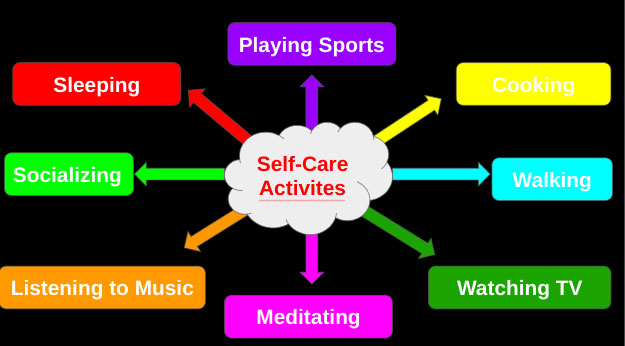Self-Care: A Way To Prevent Burnout
March 25, 2020
Self-care is encouraged by many health practitioners, especially for adolescents, but not many teens know what self-care is, how to do it, or why they should make time for it. This is a big problem because a lack of self-care is causing “adolescent burnout,” but there are ways to prevent this from happening.
What is adolescent burnout, and why should I care?
The term “burnout” was coined by Herbert Freudenberger, the author of the book Burnout: The High Cost of High Achievement, in 1974. Freudenberger describes burnout as “the extinction of motivation or incentive, especially where one’s devotion to a cause or relationship fails to produce the desired results.” This means that when motivation and energy start to fail for adolescents—and for anyone, for that matter—tasks are then harder to get done.
Performing self-care activities can prevent an adolescent from burning out, which is important because they often deal with stress and feel overwhelmed. According to a study done by the American Psychological Association, approximately 31 percent of adolescents feel overwhelmed, and approximately 30 percent feel depressed because of stress. Stress and the feeling of being overwhelmed can cause burnout because health risks can occur and affect a person’s work.
Some health risks caused by burnout include mental illnesses (depression, anxiety, insomnia, eating disorders, etc.) and/or physical illness (back/neck pain, stomach aches, dizziness, dry throat, etc.), according to Very Well Mind. One way to prevent this is through self-care.
What is self-care?
According to Adolescent Health Care, self-care is purposefully engaging in activities or behaviors regularly that provide a feeling of happiness that helps reduce stress. This can be done through physical, mental, or spiritual activities. Self-care can help a person´s present self as well as one’s future self.
Present-day self-care is doing activities that help a person feel stress-free and happy in the present moment. Future self-care is doing activities that can help relieve future stress by completing tasks that can benefit a person in the future. This process requires thinking ahead and thinking about how one can help out their future self by reducing their stress ahead of time, according to Shine. Self-care shows the most change when done regularly over a period of time
However, excessive self-care can lead to self-indulgence, which can hurt a person’s future self by preventing them from completing tasks that are necessary for their future self. An example of this is watching a favorite show to relax but in the process pushing away other responsibilities that need to be done for one’s future self, such as homework. A balance is an important part of self-care.
What are some self-care activities?
Self-care is personal since certain activities can help some people but not everyone. For example, people who love exercise will enjoy activities like running or playing sports whereas someone else might enjoy listening to music or cooking. The fact that not everything works for everyone makes finding self-care activities difficult for some people, according to Reach Out. The most important thing to keep in mind is to find things that make you feel happy.
These activities can be separated into three categories, according to NC State University: physical activities, such as sports and working out; mental activities, such as socializing; and spiritual activities, such as meditating and praying.
For these activities to prevent burnout, they must be done routinely and over a period of time, according to the Adolescent Health Center. In addition, they should be done slowly, using baby steps to have any effect. Starting too many self-care activities at once or doing too much at one time can actually lead to more stress, so moderation and slow improvement are important.
Self-care activities also include healthy habits such as routine sleep schedules, healthy eating habits, getting enough exercise, and mindfulness, according to Adolescent Health Care.
A list of self-care activities can be found here, and if finding a self-care activity seems hard, try this quiz.
Self-care and student athletes
All adolescents are affected by the possibility of burnout, but student athletes need to focus on self-care just a little more because they have more responsibilities that can add to their stress. According to Disabled Sports USA, athletes who focus on self-care can actually perform better, preventing burnout, injuries, and fatigue.
Student athletes should focus on healthy sleep patterns, healthy eating and drinking habits, and game-day routines, all of which can help with a student athlete’s mental and physical health.
Healthy sleep patterns can help improve a student athlete’s performance, according to a study done by the American Academy of Sleep Medicine. Not only does performance improve, but so does alertness and mood. Healthy sleep patterns include going to bed at a regular time every night, sleeping through the night, and waking up at a regular time.
Healthy eating and drinking habits for student athletes are important because having the proper fuel can improve performance and also prevent future health problems. Eating healthy includes eating unprocessed foods with high nutrients, and drinking water regularly is also very important.
Game day routines can also help student athletes, which might include a game day packing list, listening to music before a game to focus, and mindfulness. These routines can help a student athlete focus before a game and prevent feelings of stress or overwhelm.


